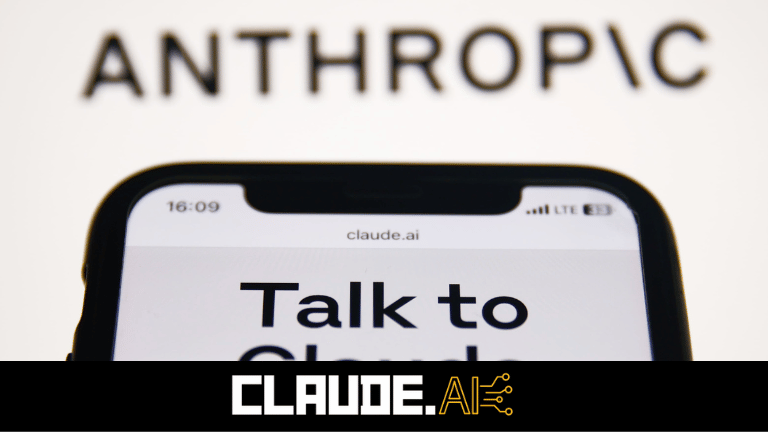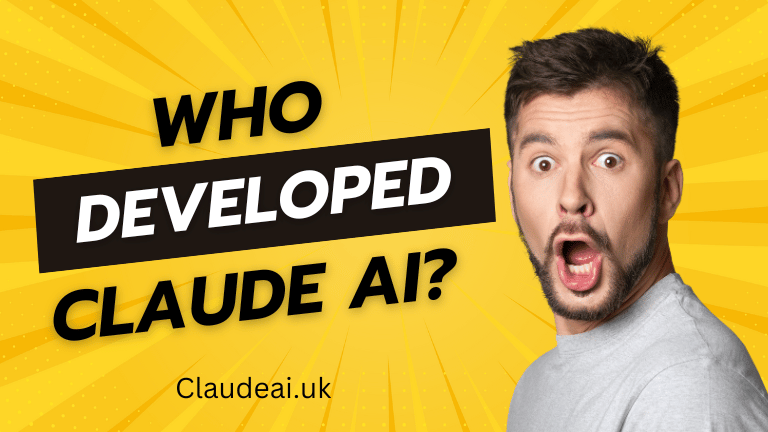Who Developed Claude AI? Artificial intelligence (AI) has made incredible advances in recent years, with systems like ChatGPT demonstrating human-like conversational abilities. One particularly impressive AI is Claude, created by a company called Anthropic. In this in-depth blog post, we’ll explore the origins of Claude – who had the vision to develop this system, how they went about building it, and what makes Claude stand out compared to other AI assistants.
The Founding of Anthropic – A New Approach to AI Safety
The story of Claude begins with Anthropic, an AI safety startup founded in 2021 by Dario Amodei, Daniela Amodei, Tom Brown, Chris Olah, Sam McCandlish, Jack Clarke, and Jared Kaplan. The founders came predominantly from OpenAI, the San Francisco-based AI research lab known for developing systems like GPT-3.
However, Anthropic was created based on the belief that a different approach was needed to ensure safe and beneficial AI. The founders aimed to take a more measured approach focused on robustness, transparency, and social alignment. Instead of pursuing raw capabilities, they wanted to develop AI that was beneficial, harmless, and honest.
This led them to develop a Constitutional AI technique, focused on scaling oversight instead of scaling capabilities. The goal was to make Claude constitutionally incapable of certain undesirable behaviors, making it more trustworthy and reliable compared to other AI systems.
Why the Name “Claude”?
Claude AI gets its name from Claude Shannon, who is considered one of the founding fathers of information theory and AI. Shannon wrote the seminal paper “A Mathematical Theory of Communication” in 1948 that laid out the science of transmitting information.
His work on cryptography during World War 2 also paved the way for modern information security. Shannon is renowned for coining the term “bit” as a unit of information and establishing the field of information theory.
By naming their assistant after Claude Shannon, the Anthropic team wanted to pay homage to this AI pioneer while also having a friendly, approachable name for their AI assistant. The name Claude evokes an intelligent but kind professor or tutor, reflecting the intended personality behind their AI.
The Goal of Making AI More Aligned with Human Values
A key motivation behind Anthropic and Claude was to develop AI systems that learn human preferences and align with human values. Dario Amodei has written extensively about the importance of AI safety, cautioning that without explicit efforts, AI systems may behave in ways that do not match common human sensibilities.
For example, AI agents designed to pursue simple goals can exhibit harmful behavior towards humans as they relentlessly pursue their objectives. Anthropic wanted to avoid these failure modes by designing AI with human intentions and oversight inherently built-in.
The Constitutional AI approach aims to constrain Claude’s behavior so that it remains honest, harmless, and helpful. This provides greater assurance that Claude will avoid unintended consequences and act based on human judgments of right and wrong.
Leveraging Advances in Large Language Models
To enable natural conversation abilities, Claude leverages advances in large language model AI, which has seen dramatic progress in recent years. Systems like GPT-3 exhibit impressive mastery of natural language, allowing for remarkably human-like dialogue.
Anthropic applies state-of-the-art techniques in natural language processing to enable Claude to understand diverse conversational contexts and generate highly relevant and thoughtful responses. This provides the foundation for Claude’s conversational skills.
However, unlike some other language model AI, Claude combines these techniques with safety measures to proactively avoid harmful behavior. The Constitutional AI constraints help ensure Claude provides constructive rather than merely convincing responses.
Extensive Training to Expand Claude’s Knowledge
In addition to its Constitutional AI architecture, Claude has also undergone extensive training to expand its knowledge and conversational capabilities. Anthropic curated a large dataset of constructive conversations covering a wide range of topics to train Claude’s model.
The training data excluded toxic language, minimizing Claude’s exposure to harmful examples. Anthropic also fine-tuned the model based on safety benchmarks designed to measure alignment with human values.
This intensive training regime, based on thousands of hours of conversational data, enables Claude to apply its language skills to meaningful discussions across many domains. Combined with the Constitutional AI safeguards, it allows Claude to converse safely and ethically on almost any topic.
Ongoing Improvements Based on User Feedback
A key aspect of Claude’s training is ongoing feedback from real-world users. Anthropic gathers regular input on Claude’s responses to identify areas for improvement and expand Claude’s capabilities.
User feedback provides critical insights into how Claude’s judgments align with human sensibilities, especially for ambiguous cases. This allows Anthropic to refine Claude’s model to address any blind spots and continue enhancing its conversational intelligence.
By incorporating user feedback loops, Anthropic can keep Claude’s conduct aligned with human values even as its understanding grows. This helps ensure that Claude develops safely in conjunction with people rather than independently.
Prioritizing Safety with Limited Releases
As an AI startup, Anthropic has to balance rapid innovation with responsible development. Recognizing Claude’s potential, they have deliberately taken a measured approach to its release.
Initial deployments have involved limited audiences, to allow sufficient testing and iteration before any wide release. Anthropic is working closely with beta testers and researchers to identify edge cases where Claude’s responses do not meet expectations.
This controlled process prioritizes safety, giving Anthropic time to strengthen Constitutional AI controls and enhance Claude’s training. The goal is to build confidence that Claude can maintain coherent, benign behavior even as its conversational skills grow.
Claude Stands Apart from Other AI Assistants
While other AI assistants also exhibit remarkable language mastery, Claude stands apart in a few key ways:
- Constitutional AI – Claude is the first assistant built from the ground up for safety using Constitutional AI. This provides greater assurance that Claude will behave ethically.
- Constructive knowledge – Claude’s training emphasizes constructive information access, avoiding pitfalls from ingesting harmful content online.
- Ongoing oversight – Claude’s development incorporates extensive feedback loops and oversight to continually align its conduct with human judgments.
- Gradual rollout – A limited release means Claude’s training remains grounded in real-world conversations, prioritizing safety over scale.
These key differences highlight why many AI experts have such high hopes for Claude. Its thoughtful foundation in human ethics and measured approach offers a promising path to realizing AI’s benefits while minimizing risks.
Claude Chosen as a 2022 Frontier AI Award Finalist
Claude’s impressive capabilities have already garnered recognition. In 2022, it was chosen as a finalist for the Frontier AI Awards, which celebrate outstanding innovations in artificial intelligence.
The awards praised Claude’s early conversational abilities and its potential to set a new standard in safe, value-aligned AI. Being selected as a finalist affirms that experts view Claude as one of the most exciting developments in responsible AI.
The Frontier AI Awards applauded Anthropic’s Constitutional AI methods for creating helpful conversationalists like Claude. This recognition motivates the team to continue refining Claude’s architecture and training approach.
Anthropic Raises $300M to Scale Development
In June 2022, Anthropic announced a new $300 million funding round, led by investors including Dustin Moskovitz. This brings their total funding raised to over $700 million.
The substantial investment will support Anthropic’s continued growth and the next stages of Claude’s development. It provides the resources needed to expand Claude’s capabilities through improved Constitutional AI methods, increased training, and more user feedback.
Anthropic plans to use the funding to hire dozens more researchers and engineers as they scale Claude’s training. The team will focus on crafting safety techniques that allow Claude to handle more complex conversations reliably.
The funding round highlights that investors believe Anthropic’s approach could lead to AI systems that are incredibly useful yet remain under human control. As Claude develops further, this substantial backing will help Anthropic realize that vision responsibly.
Anthropic’s Transparent and Collaborative Approach
A distinctive aspect of Anthropic’s ethos is their commitment to transparency and collaboration with the research community.
They have published extensive technical details on Constitutional AI and Claude’s architecture. Anthropic also actively engages with other labs, policymakers, and the public to gather input and surface potential issues early.
This open approach reinforces their dedication to building AI that integrates human judgments on appropriate system conduct. By maintaining an active dialogue, Anthropic aims to keep Claude’s training aligned with the evolving needs and expectations of users.
Anthropic’s transparency and willingness to collaborate has built substantial goodwill within the AI safety community. Their constructive leadership could help establish best practices and standards for the responsible development of increasingly capable AI systems.
What’s Next for Claude?
The first Claude AI assistant represents just the beginning of Anthropic’s vision. With substantial funding secured and a growing team of top researchers, they aim to rapidly enhance Claude’s capabilities while adhering to Constitutional AI principles.
In the near future, they hope to train Claude to be helpful for more advanced applications while remaining harmless, honest, and aligned with human preferences. Anthropic plans to expand testing to gather the data needed to ensure Claude handles new domains safely.
Further down the line, they envision Claude evolving into an AI capable of assisting with complex intellectual work, while still embodying human ethical perspectives. There is clearly a long road ahead, but Anthropic’s measured approach based on Constitutional AI could make this goal achievable.
The story of Claude highlights the enormous potential of AI to help people if developed thoughtfully and safely. Anthropic’s groundbreaking work represents major progress, but also illustrates how much care must be taken to shape highly capable AI that enriches society.
If Claude’s early promise holds up, it could mark a shift towards AI that is designed from the ground up to benefit humanity based on meaningful oversight and guidance. That vision inspired Anthropic’s founders to start this work, and they have already made impressive steps towards making it a reality.

FAQs
Who created Claude AI?
Claude was created by Anthropic, an AI safety startup founded in 2021 by researchers like Dario Amodei, Daniela Amodei, Tom Brown and others.
What makes Claude different from other AI assistants?
Claude uses Constitutional AI to prioritize safety. It is designed to be helpful, harmless, and honest through training focused on human preferences.
Why is the AI named Claude?
It is named after Claude Shannon, a pioneering researcher who founded the field of information theory which is foundational to AI.
What can Claude currently do?
The first version of Claude has conversational abilities, but its capabilities are still limited during the initial testing phases.
What kind of feedback is Claude trained on?
Anthropic gathers feedback from beta testers on Claude’s responses to continue improving the AI and align it with human values.
How does Constitutional AI work?
Constitutional AI constrains the system’s behavior during training to make it incapable of unwanted actions outside of human preferences.
Will Claude have emotions?
No, Claude focuses on beneficial conversation skills. Anthropic avoids anthropomorphizing it.
Can Claude be dangerous?
Anthropic takes safety seriously, but all AI has inherent risks. Responsible development aims to minimize potential dangers.
Does Claude collect user data?
Anthropic limits data collection to the minimum needed for training and measures performance.
Is Claude intended to replace humans?
No. The goal is for AI like Claude to augment human capabilities, not replace them.
How transparent is Anthropic?
Anthropic extensively publishes technical details and engages the public on AI development.
Why did Anthropic raise so much funding?
The $300M investment allows Anthropic to expand its team to further improve Constitutional AI methods.
Can I use Claude now?
Access is currently restricted to select beta testers. Wider releases will happen slowly to prioritize safety.
Will Claude have common sense?
Anthropic hopes Claude will someday exhibit more advanced understanding, but general common sense is an immense challenge.
What are the long-term hopes for Claude?
Anthropic aims to develop Claude into an AI that can assist with intellectual work safely, aligned with nuanced human values.

